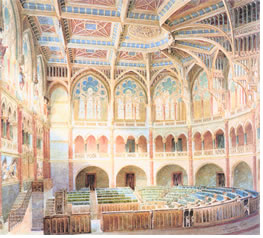
As their country prepares itself for admission to the European Union, Hungarian architects have turned to the International Union of Architects (UIA) Accord on Recommended International Standards of Professionalism in Architectural Practice for guidance on getting their professional education and licensing standards in alignment with those of the EU nations.
This move further strengthens the position of the UIA Accord as a successful protocol for bringing countries together to support the culture, health, safety, and welfare of the public through mutually recognized standards of professionalism and competence. The accord has already come into play in bringing the U.S. closer to practice reciprocity with both the EU and China.
Support from the
government
The Regional Development Committee of the Hungarian Parliament is supporting
the Chamber of Hungarian Architects in their standards review. The two
bodies have formed a joint working group to study and recommend amendments
to existing laws governing the practice of architecture and public health,
safety, and welfare. The intent is to submit these proposed amendments
to the Hungarian Parliament.
 The
Regional Development Committee further supported the Chamber of Hungarian
Architects when the architects held the International Conference on Standards
of Professionalism in Architectural Practice May 24 in Budapest. Convened
in the Upper House of the Hungarian Parliament, the conference acquainted
the Hungarian architects and public officials with the principles of professionalism
in international architectural practice and the need for harmonizing the
Hungarian legal system with the international standards.
The
Regional Development Committee further supported the Chamber of Hungarian
Architects when the architects held the International Conference on Standards
of Professionalism in Architectural Practice May 24 in Budapest. Convened
in the Upper House of the Hungarian Parliament, the conference acquainted
the Hungarian architects and public officials with the principles of professionalism
in international architectural practice and the need for harmonizing the
Hungarian legal system with the international standards.
Hungarian Parliament Regional Development Committee Chairman Istvan Balsay praised the UIA Accord as he introduced James A. Scheeler, FAIA, codirector and secretary of the UIA Professional Practice Commission that developed the Accord (approved by the UIA in 1999) and its policies.
Recognizing architecture's
special nature
The UIA has risen to the charge to develop measures relating to the qualification
requirements and procedures, technical standards, and licensing requirements
for architects based on objective and transparent criteria that do not
in themselves constitute barriers to trade in services, Scheeler said
as he explained the UIA Accord in some detail.
The UIA is particularly concerned that the international and national decision-making bodies are aware of the special nature of architecture and architectural services, he noted. While architecture shapes the physical environment, it also creates the cultural heritage of society and thus cannot be regarded as a simple commercial commodity.
Scheeler's address was augmented by reports from representatives of Austria, Croatia, the Czech Republic, Germany, Ireland, Italy, Poland, Slovenia, and Spain on the conditions in their countries.
"This extremely well-organized conference presented a broad range of information and opinion to the representatives of the Hungarian Legislature and government ministries, the regional chambers of architects of Hungary, members of the Hungarian architectural profession, and guests from other European countries," Scheeler reported following the conference. "We were exposed to a very steep learning curve. The hope is that the critical audience of those who are members of the working group to review the Hungarian standards will have found the experience as valuable as I did."
Copyright 2001 The American Institute of Architects. All rights reserved.
![]()
|
|
|